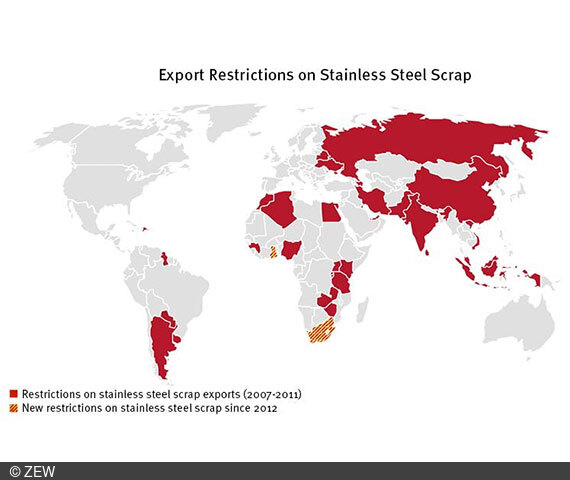The Stainless Steel Industry in Europe Requires Open Commodity Markets
ResearchStainless steel is one of the most important materials in modern industrial societies. Thus, unrestricted access to stainless steel is vital for companies in Europe. However, trade restrictions are increasingly being set up globally on the most important components of stainless steel: nickel, chromium, molybdenum and stainless steel scrap. As a net importer of the most important components of stainless steel, the European Union (EU) should actively counter this trend to secure raw material supply in the future. These are the findings of a study carried out by the Centre for European Economic Research (ZEW) in Mannheim on behalf of the raw materials trading group Oryx Stainless.
The ZEW study provides an overview of the global export restrictions on the main components of stainless steel and discusses possible strategies for the EU. While the EU is the world’s second-largest producer of stainless steel behind China, its production is entirely depending on the import of three out of the four most important raw materials, that is, nickel, chromium and molybdenum. The EU has a large stock of only one main component of stainless steel, that is, stainless steel scrap.
In the first step, the ZEW study explores the inclination of different groups of states to create export barriers. Industrialised countries in particular, which are deeply integrated in global trade and production chains, typically abstain from using export restrictions in order to continue reaping the benefits of free trade. By contrast, resource-rich industrialising countries which have a powerful position on the international market for one or more raw materials, as well as developing countries tend to set up export restrictions.
In the second step, the ZEW study gives a comprehensive overview of the export restrictions imposed on the four most important components of stainless steel for the period between 2007 and 2012. The documented restrictions include export taxes, quotas, export prohibitions and licensing requirements used in more than 30 countries. China, for instance, introduced export restrictions on all four components. Russia and Indonesia set up export restrictions on nickel; albeit the Russian accession to the World Trade Organization (WTO) came with the commitment to reduce export barriers in the future. Stainless steel scrap is subject to export restrictions in a broad range of countries.
In the third step, the ZEW researchers develop policy recommendations to the EU. The authors recommend, for example, the compilation of a comprehensive and regularly updated database of export restrictions on raw materials. This would be a means to improve transparency and to reduce transaction costs for importers of raw materials. Furthermore, the EU should assess whether the volume of public investment in research and development is still sufficient, and whether the recycling rates of raw materials could be improved. Both measures would contribute to a more efficient use of the raw materials used in stainless steel production. Over the short term, the EU should try to enforce WTO rules which oblige member states to reduce trade restrictions. Over the long run, the ZEW report considers multilateral trade agreements to be the best option for the EU to eliminate export restrictions.
Contact
Prof. Dr. Andreas Löschel, E-mail loeschel@zew.de
Frank Pothen, Phone +49 (0) 621/1235-368, E-mail pothen@zew.de
